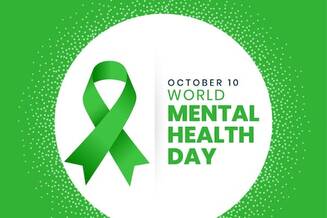World Mental Health Day, observed annually on October 10th. Dedicated to increasing mental health awareness, it was established by the World Federation for Mental Health in 1992. Retrieved online from: https://www.news18.com/lifestyle/world-mental-health-day-2023-impact-of-mental-health-on-work-and-relationships-8609176.html
May is United States Mental Health Awareness Month. This has been observed every year, since 1949, to fight the stigma, and provide support for people in the U.S. affected with mental illness. Retrieved online from: https://www.nami.org/Get-Involved/Awareness-Events/Mental-Health-Awareness-Month
Shochet, et al. (2016) say that there two interrelated deficits which seemed to have emerged and proved to be important were a lack of an individual’s – ‘connectedness’ and ‘resilience’. These ‘protective factors’, when missing, increase an individual’s weaknesses, and/or a negative outlook.
Protective factors –
- ‘Connectedness’, namely a sense of belonging, especially in school, and in times of transition/change.
- ‘Resilience’, the capacity of coping and self-regulation in the face of sudden/constant situational stress.
Shochet says this study found that individuals with autism will find a ‘positive’ mental health trajectory by identifying how well they feel ‘connected’ and/or ‘resilient’ to life’s often constant changes and challenges. Decreasing negative risks’ are vital to creating strong feelings of wellbeing and good mental health.
< My Thoughts > “…‘protective factors’…”
Unfortunately, two of the ‘core behavior symptoms’ of autism are the inability to ‘create meaningful play’, and the inability to make and maintain ‘social connections’. These things can be taught through ‘Storyboards’, ‘Social Stories’, and ‘Social Scripts’.
Ang & Loh (2019) found that parents with more support from the family and the community had less depression, anger, and anxiety. Their ‘coping style’ also had an impact on their mental health. Here are some successful ‘coping styles’ mentioned –
- Active-avoidance coping (actively attempting to avoid stressors).
- Problem-focused coping (anticipating, planning for, & managing problems ahead of time).
- Positive coping (using humor & reframing the issue).
< My Thoughts > “…less depression, anger, and anxiety.”
Again, creating ‘Storyboards’, ‘Social Stories’, and ‘Social Scripts’ can help guard against Post Tramatic Stress Syndrome, and feelings of anxiety and/or depression. Children, parents, caregivers, and teachers may all be subject to feelings of being ‘disconnected’, ‘helpless’, and ‘hopeless’; thus, risking poor mental health.
Many states fund respite programs with state or federal funds, either alone or in partnership with private organizations. Such programs are generally designed to serve one or more specific populations, such as the aging; infants and toddlers; adults or children with physical or developmental disabilities; children with special health care needs; children or adults with mental health conditions; kinship care providers; children in state custody or foster parents. Funding for these programs is generally limited and may depend on annual appropriations. Retrieved online from: www.sarasautismsite.com Know Autism, Know Your Child, with < My Thoughts > by Sara Luker.
REFERENCES:
Ang, K. & Loh, P. (2019). Mental Health & Coping in Parents of Children with Autism Spectrum Disorder (ASD) in Singapore: An Examination of Gender Role in Caring; Journal of Autism & Developmental Disorders; V49, p2129-2145.
Shochet, I., Saggers, B., et al. (2016). The Cooperative Research Centre for Living with Autism (Autism CRC) Conceptual Model to Promote Mental Health for Adolescents with ASD; Clinical Child & Family Psychology Review; V19, p94-116.

 RSS Feed
RSS Feed